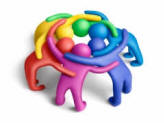|
16 week course
for young adults to enter the work force Each week = 7
hours/day 5 days a week
|
0.0 Starting your learning |
Using morning
messages to start the day
Start the class
by first breaking up the class into teams of 6-9
people. The learning will progress in
order of starting at unit 1.0 thru 9.0.
The team members are to read the
FLIP
pages prior to the class. The goal is to
get the students to begin self-learning.
When looking at the FLIP learning, it is best to
have a learning buddy studying with you.
Begin each
training session with a Video that explains the
lesson
|
|
1.0
Take charge of your learning
week 1
|
Encouraging
students to take charge of their learning
Ice
Breaker ...
Marshmallow project (Begin our thoughts
on the problem to be solved)
Brain Plasticity (Mindset)
|
Community
(Society) |
Business
Foundation |
|
Non-Verbal
Communication |
My
Appearances |
|
Study Habits
|
|
|
|
2.0
Your
strengths & Attitude
week 2
|
Valuing yourself,
attitude, confidence, Social & Emotional
learning, your goals
FLIP
About You
|
Your
Strength |
Life
Goals |
|
Attitude |
Ownership, Our Brand |
|
SEL (Social
& Emotional Learning) |
Questioning
(See below) |
|
|
3.0
Forming teams
week 3, 4 |
Setting community values,
norms
see forming team-work-2 handbook above
Flip
learning page
|
Charter (Purpose, Rules, Structure,
Community authorization, Goals)
|
Culture (
Values, Norms, Rituals, Beliefs, Moral
Compass) |
|
Similar Teams |
Coaching
Support |
|
Quality Processing |
Measurements
|
|
|
4.0
Cognitive
Tool kit for Corporate Design
Week 5,6,7 |
Project Management, Process, Customer
focus, Measurements, Communication, Questioning
FLIP
Tools
|
Planning/
Gannet charts |
Info-Mapping, Process mapping
|
|
Process
Design
& Simplification
|
Community Skills |
|
Time
Management |
Communication Tools |
|
Learning
Process |
Digital Literacy: Integrating skills using digital
skills |
| Problem
Solving Using Technology |
Computer and
Mobile Device |
Interactions
Basic Tools (e.g., Email, Word Processing) |
Data
Security and Safety |
Data Ethics |
|
|
Catalogues of work activities
Project Management
-
developing a shared
mission and objectives,
-
organizing work,
planning and follow-up
-
developing
competencies,
-
driving innovation,
customer needs
-
coordinating with
others teams
-
managing
performance— measurements
|
|
|
5.0
week 8,9 |
a)
Picking a project
... b)
Requirements & Measurements
Flip
Problem framing, Design
|
Framing the
problem |
Requirement |
|
5 Whys |
Root
Cause analysis |
|
|
6.0
week 10,11,12 |
Problem solving
process...
another design process
Circular design
Flip:
Problem-Solving
|
Divergent/
Convergent Thinking |
Critical Thinking |
|
Brain
Storming |
Creative Thinking |
|
System
Thinking |
Decision Making |
|
Magical
Thinking |
Innovation ... making things better |
|
|
7.0
week 13 |
Testing:
Testing and Reflection
FLIP:
Testing
|
Reflection
|
What
have we learned? |
|
Evaluation
of the Design |
|
|
|
8.0
week 14,15 |
Public reporting
and feedback
FLIP:
Reporting
|
Presentation, Elevator Pitch |
Meta-Cognition |
|
Listening
|
Feedback to future Teams
|
|
|
9.0
week 16
|
Follow-up refresher Monthly meeting's/
Mentoring
|
1 year
industry mentoring |
Life Coaching/
Reflection... child care, housing,
transportation |
|
Training
plan for companies to support their new
employees |
|
·
It
is the policy of Project Academy not to discriminate on
the basis of race, gender, religion, national origin,
color, homelessness, sexual orientation, gender
identity, age or disability in its education programs,
services, activities, or employment practices.
|

